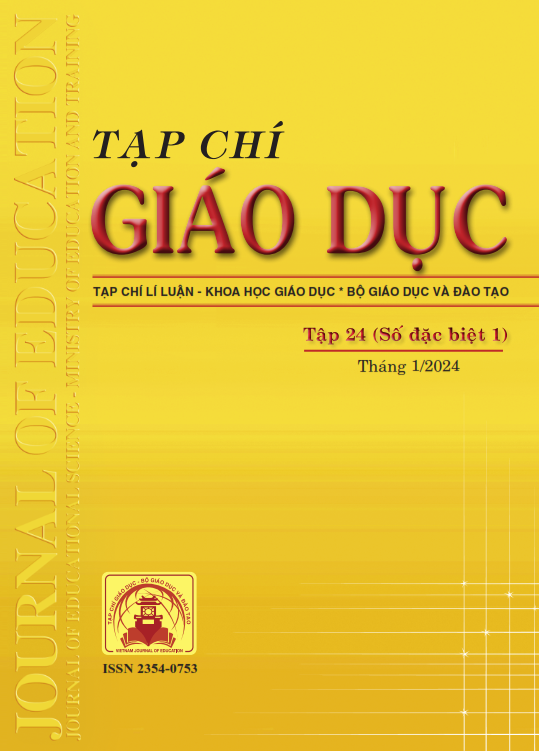Nghiên cứu đề xuất khung mô tả năng lực nói và nghe tiếng Việt của học sinh lớp 3
Tóm tắt
Speaking and listening are important communication skills. The 2018 Literature Program focuses on developing speaking and listening skills for students, considering these as two of the four language skills that need to be achieved. However, teaching and especially testing and evaluating these two competencies still have many shortcomings. We have relied on the 2018 Literature program and the Ministry of Education and Training's regulations on testing and evaluating primary school students to build speaking and listening standards in grade 3 Vietnamese. The article proposes speaking and listening standards to clearly determine the speaking and listening abilities of 3rd grade students at the end of the school year at each level. Speaking and listening competence standards in Vietnamese 3 provide teachers with tools to regularly and periodically assess students' learning outcomes according to levels, thereby adjusting teaching activities to suit students’ needs, helping students develop speaking and listening skills. We also hope that the results of this research can serve as a reference for students of the department of primary education at colleges and universities of education.
Tài liệu tham khảo
Bộ GD-DT (2018). Chương trình giáo dục phổ thông môn Ngữ Văn (ban hành kèm theo Thông tư số 32/2018/TT-BGDĐT ngày 26/12/2018 của Bộ trưởng Bộ GD-ĐT).
Bộ GD-ĐT (2020). Thông tư số 27/2020/TT-BGDĐT ngày 4/9/2020 ban hành Quy định đánh giá học sinh tiểu học.
Bronfenbrenner, U. (1994). Ecological models of human development. International Encyclopedia of Education, 3(2), 37-43.
Lê Sao Mai (2016). Sử dụng phương pháp trò chơi trong dạy học Tiếng Việt ở tiểu học nhằm phát triển năng lực nghe, nói, đọc, viết cho học sinh. Tạp chí Khoa học, Trường Đại học Đồng Tháp, 21, 17-23.
Maxwell, G. S. (2002). Are core learning outcomes standards. Queensland, Australia: Queensland School Curriculum Council.
Nguyễn Thị Hạnh (2016). Cơ sở khoa học của việc thiết kế chuẩn môn ngữ văn theo định hướng phát triển năng lực. Tạp chí Khoa học Giáo dục, 132, 15-19.
Nguyễn Thị Hồng Nam, Võ Huy Bình (2014). Chuẩn môn học và một số bài học kinh nghiệm về thiết kế chuẩn môn Ngữ văn của Việt Nam và môn Ngôn ngữ Anh của Hoa Kỳ. Tạp chí Khoa học, Trường Đại học Sư phạm Thành phố Hồ Chí Minh, 56, 116-125.
Nguyễn Văn Bản, Phan Thị Bảo Hà, Chu Thị Khánh Hà (2019). Phát triển kĩ năng nghe, nói cho học sinh lớp 2 qua phân môn Tập làm văn theo quan điểm giao tiếp. Tạp chí Khoa học, Trường Đại học Đồng Tháp, 37, 10-15. Sarah, W. (2023). What’s the Purpose of Standards in Education? An Explainer. https://www.edweek.org/
Võ Thị Tuyết Mai (2015). Rèn kĩ năng nói cho học sinh lớp 1 trong môn Tiếng Việt - nhìn từ chương trình, sách giáo khoa sau 1975. Tạp chí Khoa học, Trường Đại học Sư phạm Thành phố Hồ Chí Minh, 6(71), 81-88.
Đã Xuất bản
Cách trích dẫn
Số
Chuyên mục
Giấy phép

Tác phẩm này được cấp phép theo Ghi nhận tác giả của Creative Commons Giấy phép quốc tế 4.0 .












